Decades: Compiling the Ultimate Library with Eamonn Griffin
Back in January I began my Decades challenge. I imagined the dilemma I would face if I was a librarian and was presented with a brand new library but there were absolutely no books on the shelves. Which books would I pick to add to my library if I wanted it to be representative of the very best books which had been published?
I realised I couldn’t possibly pick all the books so each week I have been inviting guests to join me and I have asked them to select the books they believe I should add to my Decades Library.
Why is it a Decades Library? Well that’s because I ask my guests to follow two rules when they nominate books
1 – Select ANY five books
2 – You can only choose one book per decade from any five consecutive decades
This week it is my pleasure to welcome Eamonn Griffin to Grab This Book. Eamonn has picked five wonderful selections and I say this because he has chosen my favourite mix of titles. A couple which I immediately recognise (he has picked one of my favourites) and then some entirely unexpected books which sound utterly fascinating and he makes me want to read them.
Enough from me though – shall we get to these brilliant reading recommendations? I will get the books added to the Library, you can enjoy Eamonn’s choices and consider which five books you would choose.
 Eamonn Griffin lives in North Wales. He writes stuff, sometimes for money. His most recent book is East of England (Unbound, 2019), a revenge noir set in 1980s Lincolnshire. Sequels featuring protagonist Dan Matlock have long been threatened, and may yet emerge.
Eamonn Griffin lives in North Wales. He writes stuff, sometimes for money. His most recent book is East of England (Unbound, 2019), a revenge noir set in 1980s Lincolnshire. Sequels featuring protagonist Dan Matlock have long been threatened, and may yet emerge.
Other books by Eamonn include The Prospect of this City (set at the outset of the Great Fire of London), Torc (a timeslip novel set both in contemporary and in Roman-era Wester Ross in Scotland), Juggernaut (a direct sequel to RL Stevenson’s Strange Case of Dr Jekyll and Mr Hyde) and Benches of Louth, a personal geography of the Lincolnshire market town in which he grew up.
Online, Eamonn’s ill-maintained website is Eamonn Griffin Writing. He’s on Twitter at @eamonngriffin. He keeps a running reading diary at 255bookreview and contributes capsule movie reviews to 255review (his are the ones tagged ‘Eamonn’). Occasionally, he blogs about his adopted home town at Benches of Llangollen.
The photo’s about five years old, but you’d be able to use it to make a positive ID.
DECADES
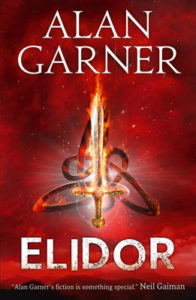 1960s: Elidor, by Alan Garner (Collins, 1965)
1960s: Elidor, by Alan Garner (Collins, 1965)
I could have chosen any of Garner’s grounded fantasies, as they’re uniformly excellent and properly weird. This is in part becuase they each meld folk traditions, ordinary lives, and relationships between place and person. While Red Shift is another favourite, I’ve gone for Elidor. This is because the fantastic elements are secured in an everyday context – a wet, drab 60s Manchester where the most fun the children at the centre of the drama can come up with is riding the lifts in John Lewis – and because at the same time there’s engagement with all manner of Celtic myth and legend while exploring the consequences of poor decision-making. This is a book I read loads of times growing up: I should really go back to it again.
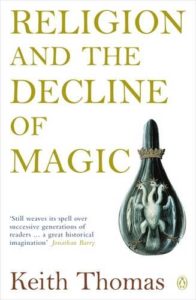 1970s: Religion and the Decline of Magic, by Keith Thomas (Weidenfeld and Nicolson, 1971)
1970s: Religion and the Decline of Magic, by Keith Thomas (Weidenfeld and Nicolson, 1971)
While its value as a history book has lessened over time because of advances in the field, new writings, and changed perspectives, Keith Thomas’s book is nevertheless a terrific entry point for anyone with an interest in the seventeenth century. The focus is on exploring how and why the British Isles shifted from faith to secularity in a century. That’s a bit of an over-simplification, but the ways in which Thomas brings together a huge array of sources into a single accessible narrative that’s impressive, stimulating, and clear are great. Also, the book’s loads of fun: it’s an immersion in religion, folk beliefs, hedge magic, and superstition while also illustrating ways in which the contexts of your life inform its nature and experience. If you’re interested in this sort of thing – and why wouldn’t you be? – then Michael Hunter’s 2020 The Decline of Magic: Britain in the Enlightenment is a very useful updating / revision / riposte to Thomas’s work.
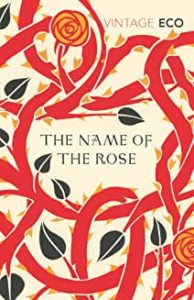 1980s: The Name of the Rose, by Umberto Eco (Pan Books, 1984)
1980s: The Name of the Rose, by Umberto Eco (Pan Books, 1984)
My favourite novel of all time to date. Simple as that. The Name of the Rose is the book equivalent of something like Scorsese’s GoodFellas: it does everything with brio and panache. Storywise, it’s straightforward: a monk and his apprentice are commissioned to investigate a series of murders in an abbey which both threaten an upcoming religious debate, and which also may be a portent of the end times. The book riffs on Sherlock Holmes, on medieval philosophy, on sign systems, on maze design, on the influence of Jorge Luis Borges, and on the importance of books, as well as on the folly of locking knowledge away. Ah, plus it’s a love story, a superb depiction of friendship, and a deathbed confession.
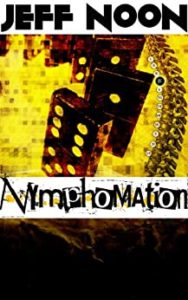 1990s: Nymphomation, by Jeff Noon (Doubleday, 1997)
1990s: Nymphomation, by Jeff Noon (Doubleday, 1997)
Nymphomation acts as a prequel to Noon’s earlier novels Vurt, Pollen and Automated Alice, and is also a terrific National Lottery satire. Set in a near-future Manchester, the book not only sets up the universe in which the later books are set, but works brilliantly as a stand-alone novel. It does that thing that good SF can do so well: give you a new perspective on the present. It’s perhaps not easy to recall what a big thing the National Lottery was in the UK when it began in the mid-90s: Nymphomation gets right to the heart of that, while exploring the prboems inherent in any system designed to extract money from ordinary people for the benefit of those already-rich, while promising a better future as a distraction from the bleakness of the everyday.
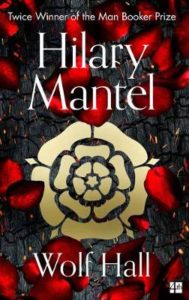 2000s: Wolf Hall, by Hilary Mantel (Fourth Estate, 2009)
2000s: Wolf Hall, by Hilary Mantel (Fourth Estate, 2009)
Mantel’s three-novel sequence charting the rise and fall of Henry VIII’s consiligere Thomas Cromwell is the great achievement of contemporary British fiction, historical or otherwise. It’s that good. If I’d had another decade to play with, I’d have picked the second book – Bring Up The Bodies – over this first novel (and I’d have popped Cormac McCarthy’s No Country For Old Men into this slot) but Wolf Hall is great in its own right, plus sets up themes and tensions that pay off over the next two books, so it more than earns its place here.
Mantel’s gift is in getting convincingly inside Cromwell, so we experience first-hand what it feels like to rise towards power, and to have to work in situations where you’re constantly being judged by your background. As a treatise on office politics it’s great, and as a detailed depiction of what court life might have been like for those serving a capricious king, it’s unparalleled. Wolf Hall deals with Cromwell’s finding favour and his working to secure the Boleyn marriage: Bring Up The Bodies addresses the collapse of that union, and Cromwell’s dedication to purging the Boleyn influence from court. Part three – The Mirror and the Light – details the crumbling of Cromwell’s place, and his struggling with the inevitability of the axe.
Anyway, these are my choices for the library. Another day, and each might well have been different!